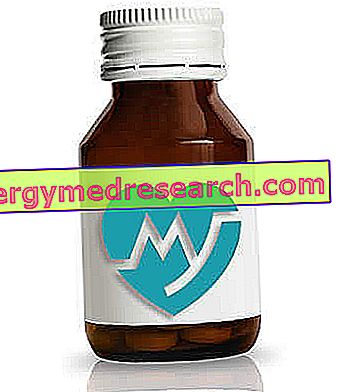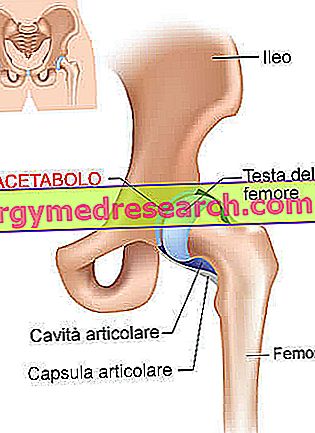Definition
By "anal itching" is meant an unpleasant and embarrassing pseudo-pathological condition in which the subject who is affected feels the need, more or less urgent, to scratch; the anal itching is localized around the anus and often also involves the surrounding skin. The itching can be more or less intense, depending on the cause.
Causes
Anal itching is the result of numerous and varied causes: candidiasis, anal dermatitis (caused by the application of drugs or contact with synthetic linen), diarrhea, thyroid disorders, psychotic disorders, anal fistulas, gonorrhea (with anal and rectal involvement), autoimmune diseases, oxyuriasis (parasitosis), anal fissures, stagnation of sweat in the perianal area, poor intimate hygiene, trichomoniasis.
Symptoms
Generally, anal itching begins in association with other symptoms, such as burning, local pain, erythema, irritation, blood loss; sometimes itching is a symptom of more or less complex diseases such as colon cancer, hemorrhoids, sexually transmitted diseases, proctitis.
Information on Anal Itching - Medications for the Treatment of Anal Itching is not intended to replace the direct relationship between health professional and patient. Always consult your doctor and / or specialist before taking Anal Itching - Medications for the treatment of Anal Itching.
drugs
Also in this case, the treatment for anal itching depends on the cause of origin, therefore any "do-it-yourself care", without consulting the doctor, is strongly advised against; so much so that some so-called home treatments can even make the disorder worse.
In general, the therapy aimed at removing the anal itching is based on the use of drugs, applied in the locus, in addition to the modification of the diet if the patient follows an unbalanced diet.
General indications for a correct diet in the context of anal itching:
- take many fibers, abundant cereals and vegetables
- avoid spicy and spicy foods
- moderate coffee consumption
- do not drink alcohol
- reduce sugars
In extreme cases, anal itching can embody an alarm bell for complex and serious pathologies such as colorectal cancer: in this case, before resorting to medication, the patient is generally subjected to a surgical operation .
There are also cases in which the anal itching is not attributable to any of the causes described above, for which the treatments undertaken are in vain: hence, in a similar predicament, a psychological disorder is conceivable, therefore the anal itching should be treated with an appropriate psychotherapeutic procedure.
Steroids : subject to medical prescription, these drugs, applied locally, reduce inflammation, pain caused by scratching and swelling, therefore the anal itching is lost. The indiscriminate use of these drugs can create serious side effects; furthermore, spontaneous interruption of therapy before completing the program established by the specialist could generate a negative reaction and facilitate relapse.
- Hydrocortisone (eg Plenadren, Locoidon, Colifoam): it is recommended to apply the drug in the form of a cream or gel directly on the skin and on the anal mucosa affected by itching. Do not apply the cream more than 4 times a day. Hydrocortisone is the drug of excellence that represents the category of steroids used in therapy to appease anal itching.
Antihistamines : this class of drugs is indicated to reduce anal itching caused by contact allergies.
- Diphenhydramine (eg. Aliserin, Difeni C FN): anticholinergic and antihistamine drug, widely used in therapy to relieve itching. It is recommended to take an oral dose of 25 to 50 mg, every 4-6 hours as needed. Do not exceed 300 mg per day.
- Hydroxyzine (eg Atarax): the antihistamine drug is indicated to resolve anal itching, at a dose of 25 mg orally (or intramuscularly), 3-4 times a day.
Antifungals and antibacterials : antifungal drugs are indicated to remove both the triggering cause (fungal infections) and secondary symptoms (anal itching). For the same reason, antibiotic drugs can be used if the anal itching depends on a bacterial insult.
- Nystatin (eg Mycostatin, Nizoral): it is recommended to administer tablets / sugar-coated tablets with 500, 000 IU nystatin per ml (or 100, 000 IU / ml oral suspension) three times a day. The duration of therapy must be established by the doctor. The drug, by removing the fungus, also promotes the resolution of anal itching.
- Anidulafungina (eg Ecalta): it is an echinocandin with antifungal activity. The drug is presented in powder form for infusion solutions. It is prescribed to treat diseases such as systemic candidiasis and candida vulvovaginitis, accompanied by various types of anal itching. The drug is administered with an initial dose of 200 mg on the first day, followed by 100 mg / day for about two weeks. The duration of the treatment must be established by the doctor.
For further information: see the article on drugs for the treatment of candidiasis and to treat vaginitis.
Topical anesthetics:
- Pramoxina (eg Proctofoam HC): it is a local anesthetic, useful for reducing the perception of discomfort, pain and burning that often accompanies itching after scratching. The product should be applied to damaged skin, 3-4 times a day, or according to other medical indications. The drug is also indicated for the treatment of hemorrhoids.
- Lidocaine (eg Vagisil, Lidoc C OGN, Elidoxil): it is a drug belonging to the class of anesthetics. Also available in the form of 0.5% cream and 2% gel; it is recommended to apply the product directly on the skin affected by itching 3-4 times a day, as needed.
Other substances to treat anal itching :
- Methylene blue: its use (1% perianal infiltration) is generally recommended in association with local anesthetics, to enhance the therapeutic action of the latter.
- Zinc oxide: zinc oxide has anti-irritative properties and - often found in association with other substances such as sweet almond oil, beeswax, vegetable glycerol - is indicated to reduce itching by creating a sort of protective barrier in the perianal area.
- Eosina (eg Neomercurocromo): the therapeutic use of this substance to treat anal itching is quite rare, although it is used by some specialists for the disinfectant therapeutic action (in case of bacterial infections associated with anal itching).
- Loperamide (eg. Imodium): it is an antidiarrheal drug; in fact, diarrhea can be a responsible cause of anal itching. Initiate treatment for acute diarrhea with 4 mg of drug per os, to be taken after the first evacuation. Continue therapy with 2 mg of substance (do not exceed 16 mg in 24 hours). Generally, the disorder vanishes in 48 hours. Do not take the medicine for more than 5 consecutive days. The administration of probiotics is recommended, useful for rebalancing the altered intestinal flora.
Additional general indications for the prevention and control of anal itching:
- avoid scratching → rubbing worsens the condition
- wear non-synthetic underwear; prefer breathable cotton clothing
- do not use aggressive detergents: prefer delicate products and warm water to avoid worsening the itching



